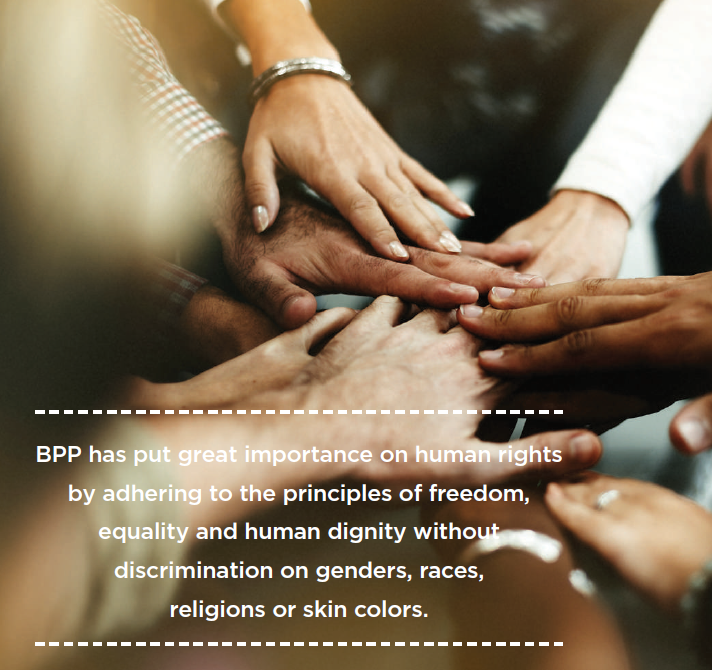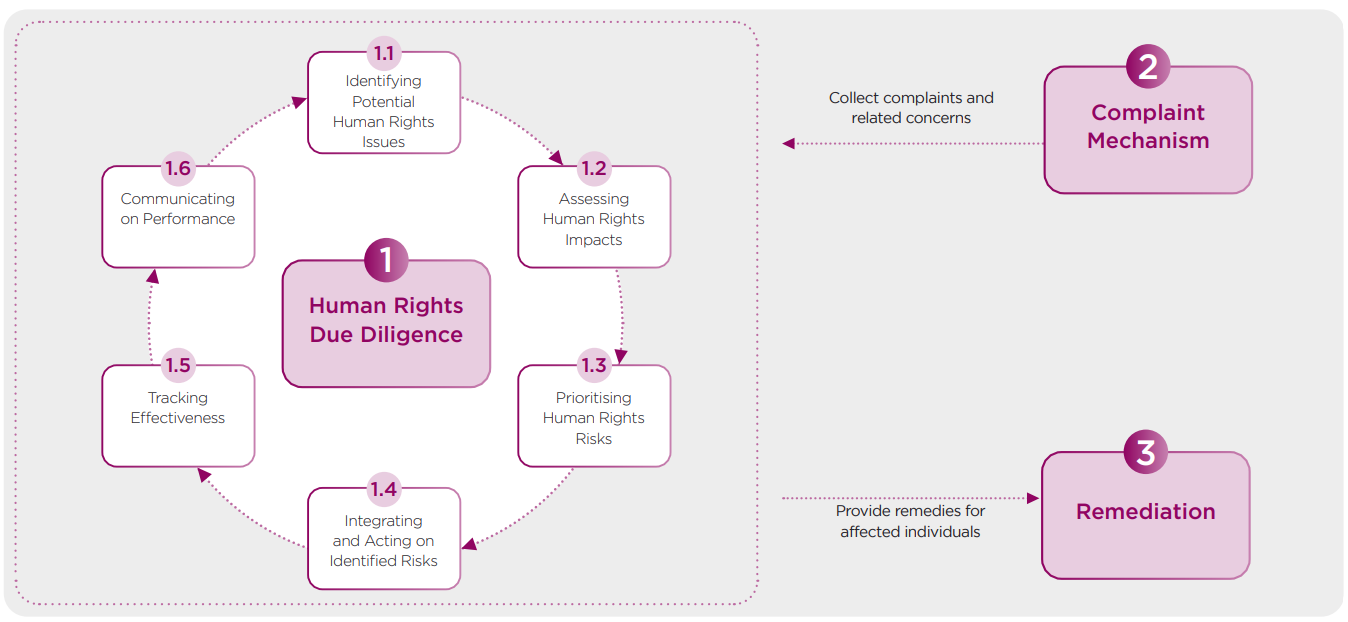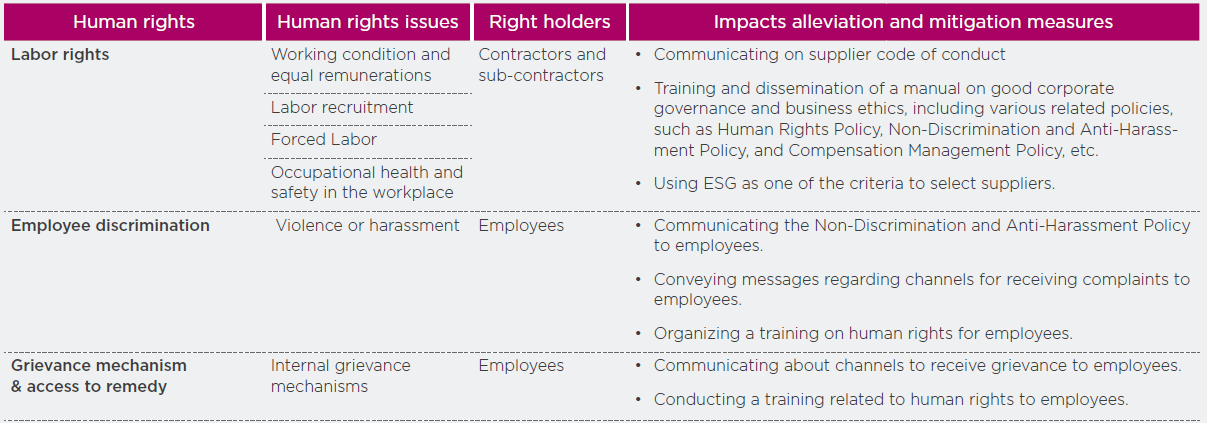Significance
The Company recognizes the importance of rights, liberty and equality that every human being deserves equally, which is the fundamental rights to be a human being without discriminations caused from the difference such as genders, races, religions or skin colors. The operation that considers human rights is therefore a part of the sustainability to society.

Management Approach
BPP is committed to conducting businesses respecting and protecting human rights in accordance with international standards in order to build confidence on its operations among the stakeholders. The human rights risks have been managed and assessed in 6 areas: employment, occupational health and safety, customers and products, communities, security, contractors and supply chains, all of which support the corporate governance and sustainable growth.
BPP together with Banpu Group have announced the guidelines for conducting a comprehensive human rights risk assessment or humans rights due diligence (HRDD) to be used as an instruction for identifying, evaluating, preventing, and mitigating human rights risks on operations, products, and services in accordance with the international standards and guidelines, namely the International Human Rights Bills, the UN Guiding Principles on Business and Human Rights (UNGP), the OECD Due Diligence Guidelines for Responsible Business Conduct, and the International Labor Organization’s (ILO) Declaration on Fundamental Principles and Rights at Work. As such, HRDD is an important tool to identify, prevent, and manage human rights risks and impacts within BPP’s operations and the supply chain. It has been updated and referred to in alignment with the industry standards and best practices so as to ensure that BPP operate in line with the international standards and continually develop its human rights guidelines.
The HRDD procedure consists of complaint investigation and remediation processes, which have 4 main steps:
- Identifying, assessing and prioritizing actual or potential human rights risks.
- Integrating and implementing according to the identified risks.
- Monitoring and measuring performance.
- Communicating with internal and external stakeholders.
In addition, a complaint investigation mechanism allowing affected people or stakeholders to submit concerns or grievances about human rights violations through a secure and accessible channel, has been provided. In the event that the violation cannot be prevented, BPP has determined the remedies to mitigate such impacts. This may include compensation, restitution, or changes in operating practices to prevent further damage.

To instill confidence among all stakeholders that its operations are conducted ethically and responsibly, respecting human rights, BPP reviews its HRDD every 3 years or whenever there are significant changes. Additionally, the impacts arising from BPP’s operations are regularly assessed, and stakeholders’ feedback is collected to drive improvements.
Performance
- Communicating about human rights on the topic of Human Rights Due Diligence (HRDD) guidelines to all levels of employees within the organization. The aim was to make employees understand the relationship among the business, the organizational supply chain and the key stakeholders associated with human rights. In addition, the human rights assessment guidelines leading to an improvement of business operations with human rights responsibility in all areas have been proposed.
- A human rights due diligence (HRDD) was conducted at BLCP Power Plant – BPP’s joint venture company, by the external consulting firm. BLCP’s HRDD was conducted with stakeholders both outside and within the organization, including employees, suppliers, customers, contractors and communities covering the environmental, social and governance areas, etc. This is considered as a proactive management system to prevent and mitigate human rights impacts on stakeholders. The HRDD results found that BLCP Power Plant has no human rights related risks.
- Using HRDD results to develop and improve the human rights practices, such as determining a supplier code of conduct in line with the international standards, improving and providing clear and secured communications and reporting channels for stakeholders. Equality in all levels within the organization has been promoted by announcing the equality policy to demonstrate BPP’s commitment to maintaining the long-term human rights standards.
- Conducting the organization’s HRDD by assessing the human rights risks according to guidelines for comprehensive examination of human rights status of listed companies, which was arranged by the Securities and Exchange Commission (SEC) in collaboration with the Faculty of Law, Chulalongkorn University. According to the assessment, BPP’s risks related to human rights issues are relatively low. BPP has used the results to improve its human rights operations as well as communicated such assessment results to create awareness among its employees in order to prevent human rights violations and to promote the tangible integration of human rights work into the current business operations.
Key Activities and Projects
Respecting and complying with human rights principles
BPP has determined the Human Rights Policy by attaching with the principles of liberty, equality, and human dignity, regardless of genders, races, religions, or skin colors. It has paid great attention to labor laws and respected human rights in alignment with the Universal Declaration of Human Rights (UDHR), the United Nations Global Compact (UNGCs), the International Labor Organization (ILO), and the labor laws of all countries where it has operated business. This covers labor operations of BPP employees and stakeholders, such as business partners, suppliers, communities, joint-ventures, and external contractors. BPP’s labor practices consist of all aspects of human rights, including:
- Forced labors employment BPP does not accept forced labor in any form. In addition, physical punishments, threats or violence are not used as disciplinary or control measures.
- Exploitation of child labor BPP has clearly determined the minimum age of hiring employees in accordance with the labor laws of each country to prevent risks associated with child labor employment.
- Female labor BPP does not assign works harmful to health or body as required by laws to female employees, while the pregnant employees are accommodated to work or live in an appropriate environment, including unable to lay off, demote positions or reduce various welfare benefits of female employees due to pregnancy.
- Hiring migrant workers BPP and its business partners strictly comply with the laws on both employment contracts and work permits when hiring migrant workers to enhance competitive advantages and to grow together sustainably.
- Working environment and workers’ quality of life The appropriate and sound employment conditions are promoted for employees, including maintaining a safe working environment to ensure that employees have a good life quality and can perform their duties without affecting their physical and mental health. BPP has also operated in accordance with the occupational health and safety standards and reviewed related regulations regularly to develop and improve them appropriately.
- Freedom of association and collective bargaining BPP respects employees’ rights and gives them the freedom to join various associations, unions, federations, and collective bargaining. It will not impede the trade union operations or labor federation or obstruct the exercise of employees’ rights to become members of a labor union. This includes providing them convenience and will treat the representatives equally to other employees.
- Supporting business partners and contractors in the supply chain BPP treats its business partners and contractors in the supply chain in accordance with the human rights principles, including not being involved with human rights violations.
Human Rights Impact Assessment
In 2023, BPP conducted a Human Rights Impact Assessment under a Human Rights Due Diligence process for the renewable energy business in Vietnam and the thermal power business in Thailand, which is a joint venture. BPP collects information through an interview with rights holders, including employees, contractors, sub-contractors, security guards, local communities and vulnerable groups consisting of women and pregnant women. According to the impact assessment results and the consideration of existing risks control measures, it was found that most of human rights issues were at a low to moderate level. BPP, therefore, has set up measures to alleviate and reduce impacts as follows:

Document Download
Human Rights Policy
Banpu Group’s Non-Discrimination and Anti-Harassment Policy
Banpu Group’s Human Rights Due Diligence Manual




